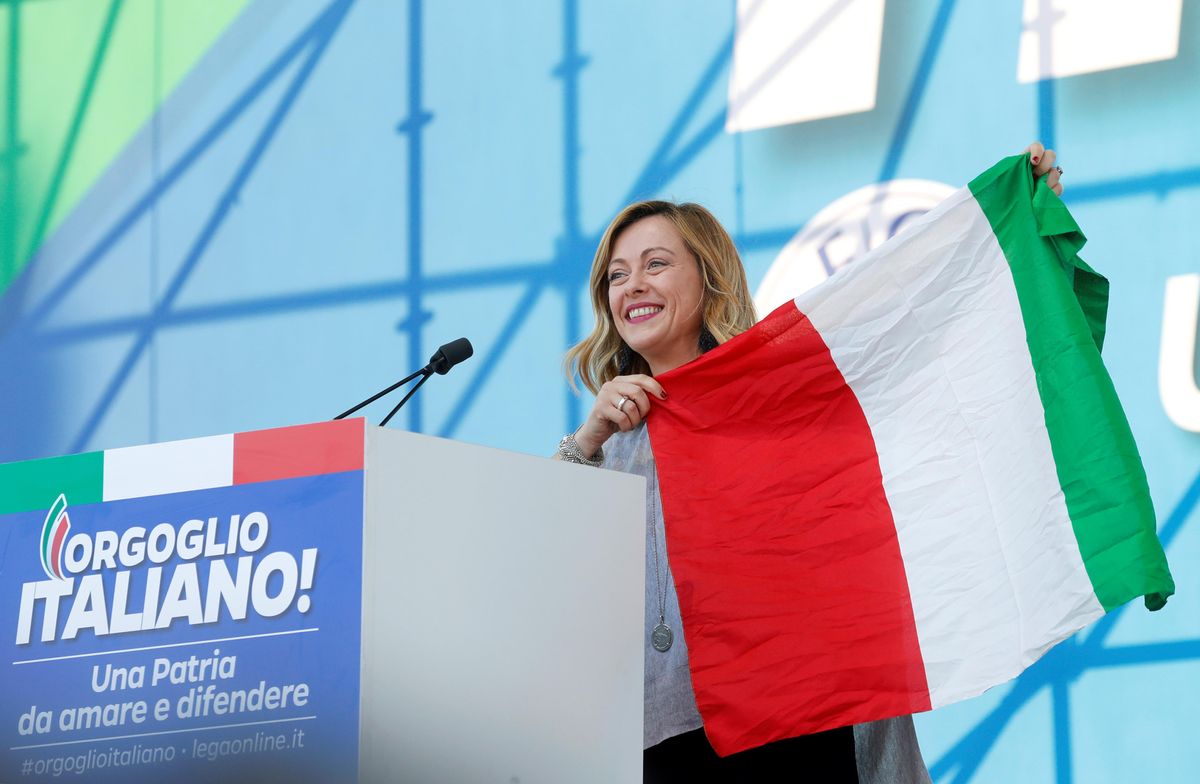Italy's politics are a rollercoaster ride in the best of times — the country has had 18 governments in the past 32 years — and despite the best efforts of current Prime Minister Mario Draghi to navigate the COVID crisis, Italians may well be in for another sharp turn in coming months.
This time, however, populist firebrand Matteo Salvini may not find himself in the front seat. Meet Giorgia Meloni, Italy's rising populist star.
Italy's state of play. Three years ago, Salvini looked to be Italy's prime minister in waiting. But a series of political missteps, including his push for an ill-conceived early election in 2019, left him in opposition. Salvini remained the country's most popular politician, but in 2020, COVID devastated Italy and its economy, blunting the force of Salvini's anti-immigrant, anti-EU message by leaving the country dependent on outside help.
After the previous government collapsed, Draghi, a former European Central Bank president, was called upon in February 2021 to form a government of national unity. Faced with the pandemic — the coronavirus has killed more people in Italy than in any other EU country — and the need to work with the EU on financial relief for his beleaguered country, Draghi extended a hand to both the left and right. The center-left Democratic Party and anti-establishment Five Star party agreed to join his coalition. Crucially, so did Lega, Salvini's party.
That's when Salvini and his Lega party began to drop in the polls. Some voters who liked his anti-immigrant fist-shaking and his attacks on EU leaders decided that Salvini had sold out by letting Lega join Draghi's government, which has accepted EU reform demands in exchange for rescue funds.
In search of a more authentic far-right alternative, they turned to the Brothers of Italy, the largest party in parliament that refused to join Draghi's unity coalition. Since then, that party's charismatic leader, Giorgia Meloni, has been rising in the polls.
A survey this month from Corriere della Sera, a Milan-based daily newspaper, named Meloni the second most popular politician in Italy after former prime minister Giuseppe Conte. Salvini is now tied for fourth after falling from 39 percent approval one year ago to 30 percent. A range of polls also reveals that Brothers of Italy is now the country's fastest-rising party, and Lega is the fastest falling. Lega's remaining lead in polls of all parties has dwindled to almost nothing.
Meet Meloni. Just 43, Meloni has more than 25 years' experience of bare-knuckled Italian politics. Still a teenager, she joined the youth group within Movimento Sociale Italiano (Italian Social Movement), a barely reconstructed fascist party inspired by Benito Mussolini. After moving to the right-wing Alleanza Nazionale (National Alliance), she became minister of youth in one of the many governments led by former prime minister Silvio Berlusconi in 2008. In 2014, she helped found Brothers of Italy.
The party has struck an even harder line than Lega has. The Brothers want to blockade migrants from reaching Italian ports, boost Italy's birth-rate to ease the need for migrant labor, and defend "God, fatherland and family," an old-school fascist slogan.
Though Meloni doesn't favor an Italian exit from the EU, she wants to "re-discuss" existing EU treaties and the single currency. She also wants to amend Italy's constitution to give Italian law priority over European law. But it's her decision to keep Brothers of Italy out of the current government that underscores her talent as a political strategist.
Meloni's moment? In recent months, COVID has forced Italians to worry less about migrants than about vaccines and economic recovery. That's about to change. The pandemic will ease in coming months, and more boats will head for Italian shores. In fact, more than 13,000 people have already arrived this year, triple the amount over the same period last year. Warmer weather will continue that surge.
Italy will hold elections sometime between early next year and mid-2023, and if Draghi decides he would rather become president than remain prime minister once the pandemic has lifted, the earlier time frame for elections becomes likely. With support from Berlusconi's Forza Italia, Lega and Brothers of Italy might well form the next government.
If so, that might ignite a true battle for the right. Meloni and Salvini both want to be prime minister. Only one can carry the day.






